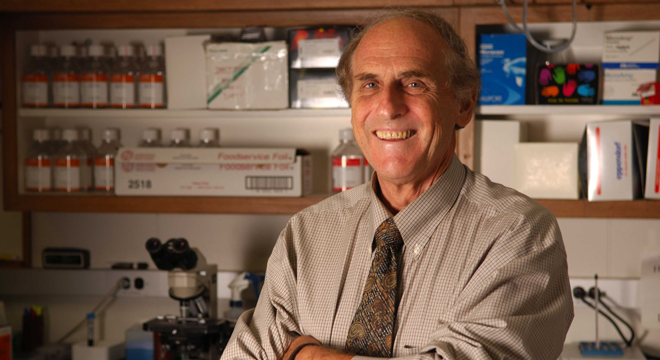It’s Nobel Prize Week again, and the organization named for Swedish dynamite inventor Alfred Nobel has already bestowed two honoraries on six winners, including one bittersweet posthumous award.
On Monday, one half of the $1.46 million Nobel Prize in Physiology or Medicine was awarded to the heirs of Canadian-American scientist Ralph M. Steinman,of Rockefeller Univesity in New York, “for his discovery of the dendritic cell and its role in adaptive immunity.”
Steinman, who had used his research results to treat his own pancreatic cancer, died Friday at the age of 68, after a four-year struggle with the disease.
He had joked with his family about holding on till at least Monday to see if he could win the prize.
“We wanted him to be here for this,” daughter Alexis Steinman, 34, said, Reuters reported. “We were like ‘OK Dad, I know things aren’t going well but the Nobel, they are going to announce it next Monday’. And he’s like: ‘I know I have got to hold out for that. They don’t give it to you if you have passed away.
The Vancouver Sun and Montreal Gazette have excellent interviews with his other surviving family members, including his wife and mother.
Indeed, though he may have been jesting about living just a few more days specifically to see his life’s work win the top prize in Medicine, Steinman was right about the fact that the Nobel Committee doesn’t normally give out posthumous awards, in the exception of winners who have already been picked and who die before they actually are told of the award.
But in Steinmann’s case, the Committee wasn’t aware of his passing on Friday, only finding out after voting to give him the award and then calling his family on Monday.
Still, there’s little doubting that others have benefitted and will continue to benefit from the accomplishments in the field of medicine. The dendritic cell, first discovered by Steinman and his collaborator Zanvil A. Cohn in 1973. Cohn passed away in 1993 of aneurysm.
According to the Rockefeller University website, “His work has led to a new understanding of the control of tolerance and immunity and was the genesis for a new field of study within immunology: the role of [dendritic cells] in immune regulation, their potential for discovering new vaccines and treatments of autoimmune disorders.”
The other half of the prize in Physiology or Medicine went to the team of American researcher Bruce A. Beutler and French researcher Jules A. Hoffman, who pioneered work on the immune system as well.
In less dramatic but still noteworthy news, Beutler, is actually the fourth Nobel winner from the Scripps Research Institute, but he’s leaving to take a new job at the University of Texas, North County Times reports.
On Tuesday, the Nobel Committee of Physics also split the prize between scientist American Saul Perlmutter and a research team consisting of American Adam Riess and U.S.-Australian citizen Brian Schmidt, for their collective “discovery of the accelerating expansion of the Universe through observations of distant supernovae.”
Specifically, Perlmutter, of Lawrence Berkeley National Laboratory in California, discovered the expansion itself and published the findings in 1999, while Schmidt, of the Australian National University and Riess of the Space Telescope Institute in Baltimore independently measured the expansion and published a paper in 1998, all of them using digital sensors to detect supernova brightness, Nature reports.
The journal also adds: “The discovery was accepted almost immediately by the astronomical community — in part because the idea of a cosmic pressure pushing the Universe outwards had already been mooted by Albert Einstein.”
In a cosmically bitter sense, their discovery suggests that the universe will eventually freeze into ice, Fox News reports.
The rest of the Nobel Prizes are coming this week and early next: Chemistry on Wednesday, Literature on Thursday, Peace on Friday and Economics on Monday. Of course, predictions have already been made for all of these awards, with the Nobel Peace Prize
Follow the announcements live on the Nobel Prize organization website and later on TPM’s Idea Lab.






